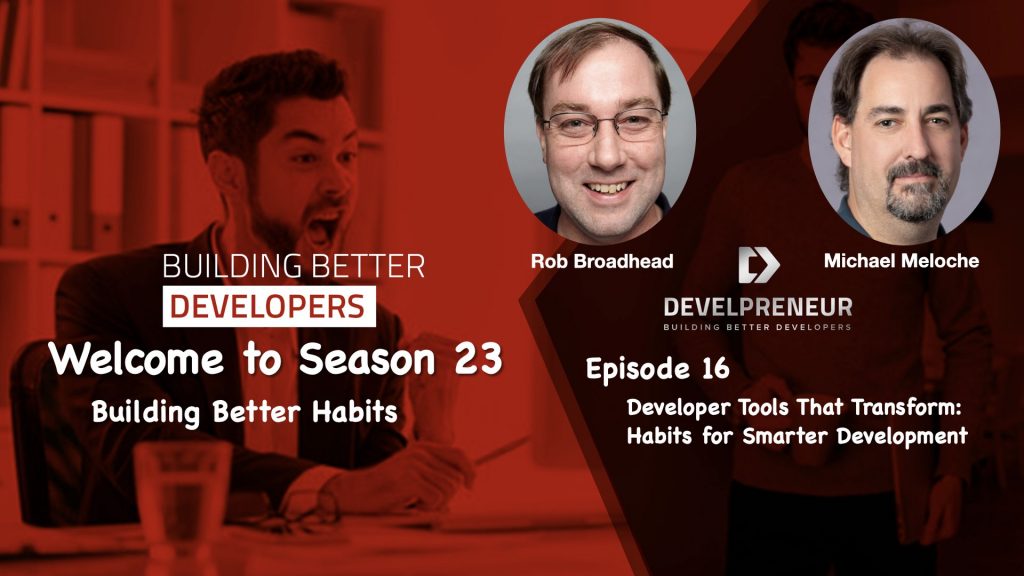In the ever-evolving world of software development, the tools you use can either streamline your workflow or slow you down. Mastering the right developer tools isn’t just about efficiency—it’s about transforming how you approach challenges and fostering habits that drive smarter, more effective development. The Building Better Developers podcast dives deep into this topic, exploring how thoughtful tool selection and intentional habits can lead to meaningful growth and productivity. Let’s explore how developer tools can be a catalyst for transformation in your work.
Why Developer Tools Matter
The podcast emphasizes that developer tools are not just about improving efficiency—they shape how we think and solve problems. Tools like integrated development environments (IDEs), task management software, and even simple utilities help bridge the gap between idea and execution.
Choose tools that enhance, not complicate.
When evaluating tools, prioritize simplicity and integration over complexity. As Rob Broadhead explains, “Avoid tools that add work. The app should improve your life, not make it harder.” For instance, while tools like QuickBooks Desktop streamline accounting, their online counterparts may introduce unnecessary complexity.
Evaluating Developer Tools: A Framework
The podcast introduces a structured approach to evaluating tools. Here’s a summarized framework:
- Define Your Needs: Identify the problems the tool should solve. Is it for task tracking, bug fixing, or customer relationship management?
- Research: Use online comparisons or customer reviews. Google terms like “alternatives to [tool]” or “tools like [tool name]” to discover your options.
- Test the Tools: Take advantage of free trials or demos to assess usability and functionality.
- Measure ROI: Evaluate the time and effort saved versus the cost of the tool.
By taking this methodical approach, you avoid the common trap of jumping into tools without a clear purpose.
Common Pitfalls with Developer Tools
Michael Meloche warns against several pitfalls, including:
- Over-complicating workflows: Switching between multiple tools can lead to inefficiency. Find one that meets most of your needs and stick with it.
- Time sinks: Developers often spend hours experimenting with tools that don’t provide meaningful value. Set clear time limits for evaluating new software.
- Redundancy: Avoid using multiple tools for the same task. For example, don’t use three bug trackers when one robust option like Jira will suffice.
Remember, the goal isn’t to try every tool but to find those that integrate seamlessly into your existing processes.
Top Developer Tools Mentioned
The podcast lists several essential categories of tools every developer should explore:
- Task Management: Tools like Jira, Asana, and Monday.com streamline task organization and collaboration.
- Version Control: Git remains the gold standard, with platforms like GitHub and GitLab offering enhanced collaboration features.
- Time Tracking: Tools like Toggl help track productivity and billable hours effectively.
- Communication: Slack and Microsoft Teams are ideal for keeping remote teams connected.
The Seasonal Approach to Tool Mastery
Rob proposes a seasonal approach to tool evaluation. Instead of randomly testing tools throughout the year, dedicate specific periods to exploring certain categories. For example, focus on marketing automation tools one season and customer relationship management tools the next.
This method ensures you gain deep knowledge of tools relevant to your work without overwhelming yourself.
Tips for Implementing New Tools
- Start Small: Test one feature at a time. For instance, if trying a new IDE, begin by configuring it for a small project.
- Involve the Team: Gather input from colleagues to ensure the tool works across the board.
- Track Impact: Use metrics to evaluate the tool’s impact, like reduced project delays or improved code quality.
Challenge for Developers
The podcast ends with a challenge: spend seven days exploring a new category of tools. Here’s how to get started:
- Day 1: Research tools in a specific category (e.g., bug tracking or time management).
- Days 2-6: Spend 10-15 minutes each day testing different tools.
- Day 7: Evaluate your findings and pick the one that fits best.
This simple exercise sharpens your evaluation skills and helps you discover tools that genuinely improve your workflow.
Final Thoughts
Building better habits and mastering tools isn’t about chasing every shiny new app. It’s about intentional choices that align with your goals. As Rob Broadhead wisely concludes, “It’s not about doing more; it’s about doing what matters.”
Take the time to evaluate your toolset, and you’ll find yourself not just working harder but working smarter. Ready to embrace the challenge? Let us know your top tool picks!
Stay Connected: Join the Develpreneur Community
We invite you to join our community and share your coding journey with us. Whether you’re a seasoned developer or just starting, there’s always room to learn and grow together. Contact us at [email protected] with your questions, feedback, or suggestions for future episodes. Together, let’s continue exploring the exciting world of software development.

